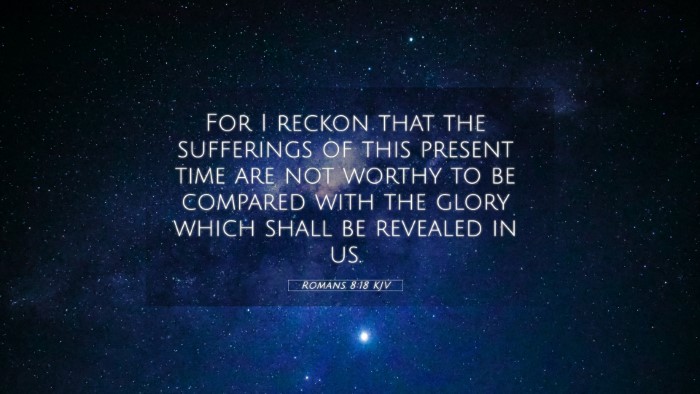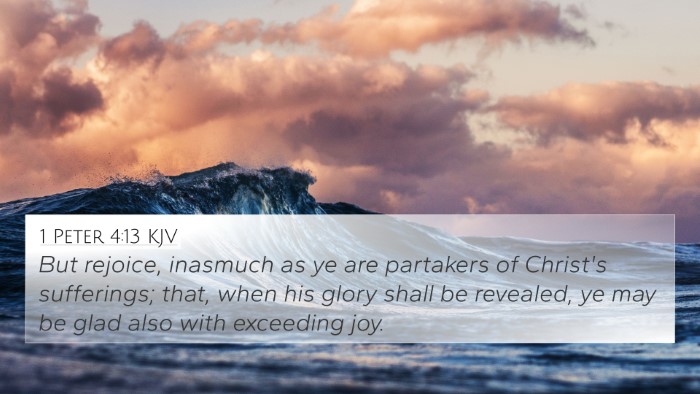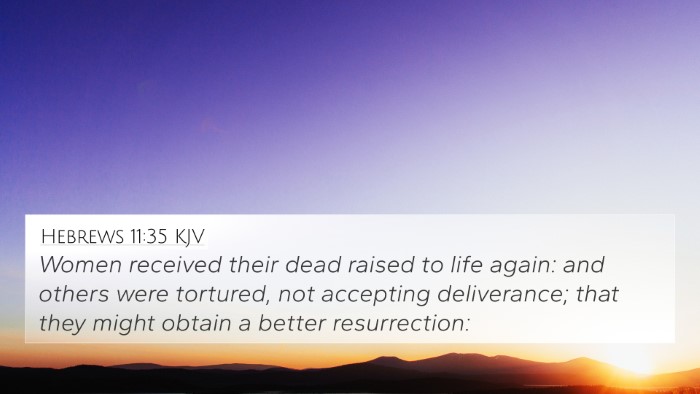Understanding Romans 8:18
Romans 8:18 states: "For I consider that the sufferings of this present time are not worth comparing with the glory that is to be revealed to us."
This verse serves as a profound reminder of the contrast between temporary sufferings and eternal glory. The Apostle Paul writes to the Roman believers, reassuring them that their current trials are insignificant when compared to the magnificent future that awaits them.
Commentary Insights
- Matthew Henry: He emphasizes that the sufferings that believers face are not merely physical or emotional pain but can also include persecution for their faith. Henry points out that these sufferings are momentary compared to the everlasting joy of being in the presence of God.
- Albert Barnes: Barnes highlights the certainty of future glory, asserting that the "glory to be revealed" refers to the eternal state of blessedness that awaits the redeemed. He contrasts the present sufferings with the unsurpassed joy of heaven, emphasizing that the promise of eternity helps believers endure their trials.
- Adam Clarke: Clarke notes that the phrase "not worth comparing" signifies that no amount of suffering can diminish or detract from the future glory. He elaborates that this glory will far exceed any earthly experience, confirming God's faithfulness to His promises.
Thematic Connections
Romans 8:18 connects to various other scriptural passages, allowing for a deeper understanding through cross-referencing.
- 2 Corinthians 4:17: "For our light and momentary troubles are achieving for us an eternal glory that far outweighs them all." This verse mirrors the sentiment of Romans 8:18, emphasizing the transient nature of earthly troubles.
- Philippians 3:20-21: "But our citizenship is in heaven. And we eagerly await a Savior from there, the Lord Jesus Christ..." This passage speaks to the focus on eternal life and the glory to come.
- 1 Peter 5:10: "And after you have suffered a little while, the God of all grace, who has called you to his eternal glory in Christ, will himself restore, confirm, strengthen, and establish you." This reinforces the promise of restoration following suffering.
- Revelation 21:4: "He will wipe every tear from their eyes. There will be no more death or mourning or crying or pain..." This passage encapsulates the future hope of believers, echoing the theme of glory to come.
- John 16:33: "In this world you will have trouble. But take heart! I have overcome the world." Jesus offers assurance through suffering, emphasizing victory and hope.
- Romans 5:3-5: "Not only that, but we rejoice in our sufferings, knowing that suffering produces endurance, and endurance produces character, and character produces hope..." This highlights the constructive purpose of suffering, leading to glory.
- Hebrews 12:1-2: "...let us run with endurance the race that is set before us, looking to Jesus, the founder and perfecter of our faith..." This encourages perseverance through trials while focusing on the reward ahead.
Interpretive Insights
When delving into the meaning of Romans 8:18, connections between Bible verses can greatly enhance understanding. Here are some key points:
- The acknowledgment of suffering is crucial for Christians to validate their experiences, yet it must be seen within the larger framework of God's promises.
- There is an intrinsic link between present hardship and future glory, suggesting that trials serve a divine purpose in the believers' lives.
- Cross-referencing these scriptures reveals a consistent Biblical theme: pain and suffering lead to spiritual growth and eternal rewards.
- The importance of focusing on the eternal rather than the temporary is a ubiquitous message throughout the New Testament.
- This verse encourages believers to maintain hope and to strive for a godly life, trusting in the promises of God despite current circumstances.
- It also serves as a reminder of the community of faith, encouraging believers to support one another through their struggles.
Conclusion
In conclusion, Romans 8:18 is a profound reminder of the temporary nature of our sufferings in the light of eternal glory. When we engage in comparative Bible verse analysis with related scriptures, we see a rich tapestry of encouragement and hope woven throughout the Bible. This multifaceted approach not only deepens our understanding but also provides the necessary tools to navigate our trials with faith.















